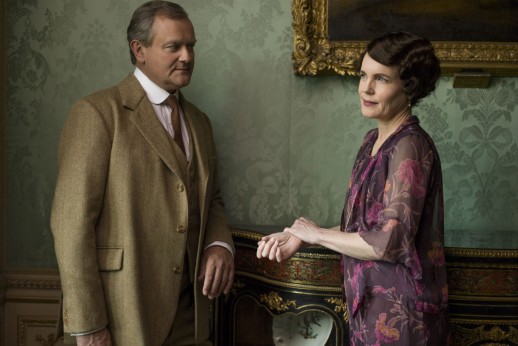Article by Ellen Gray for Philly
Lady Mary’s had her Matthew, Bates his Anna. But as Downton Abbey enters its sixth and final season on PBS’s Masterpiece Sunday, the greatest love story – beyond the one between the show and its fans – may belong to the long-married couple whose union made the whole thing possible.
So a toast, please, to Lord and Lady Grantham (Hugh Bonneville and Elizabeth McGovern), whose marriage of convenience became a love match in which the earl, Robert Crawley, got much more from his American wife, Cora, than just the money to keep his sprawling estate going, and she got more than their three headstrong daughters and the right to be called “milady.”
“They’ve been through some bumps, you know,” Bonneville said in an interview last summer.
“Robert’s head was turned [by a housemaid in Season 2], Cora’s head was turned [by an art aficionado in Season 5], and through it all they’ve managed to stick together, which I think is a pretty good recipe for a marriage, to put up with the rough and the smooth. And as we draw the story to a close, they’ve pulled through together pretty well. If that’s a love story, then it’s a good one, yeah,” he said.
McGovern, in a separate interview, said fans have told her “that they’ve really appreciated seeing people who still have a love after many, many years in a marriage. It’s not a thing that you see a lot of on TV. And it’s quite refreshing.”
It didn’t hurt that Bonneville and McGovern had been down this aisle before together.
“It’s the third time we’ve played husband and wife,” he said.
“We did a show called Thursday the 12th, which was a political thriller-type thing. I was only in it very, very briefly as her husband. And we did a short-lived comedy, probably one of my favorite shows I’ve ever done, called Freezing, about an actress called Elizabeth McGovern who comes to live in London rather than follow her Hollywood career.”
In real life, McGovern, nominated for an Oscar in 1981 for Ragtime, did leave Hollywood. Married since 1992 to British director Simon Curtis (Woman in Gold), she’s long made her home in Britain.
“I absolutely love working with Hugh. He’s a very unpretentious actor,” McGovern said.
“It’s “complete coincidence” that they were cast together in Downton, Bonneville said, while laughingly recalling an episode in Freezing in which “her agent . . . gets her a gig playing a maid in a Julian Fellowes costume drama.”
In creating Downton Abbey, Fellowes had initially been thinking of the women novelist Edith Wharton wrote about in The Buccaneers, Bonneville said, American heiresses of the mid- to late 19th-century and early 20th century who found titled husbands abroad.
“How were they 20 years down the line? Were their marriages successful? Were they miserable? Did they regret doing that cash-for-honors thing? Did they regret buying into the British aristocracy?” he said.
Those marriages, at least in Wharton’s telling, didn’t all fare well, but McGovern, who’s done some further reading, said that “a lot of them did . . . and you do find instances of women who really made a success of it, along with a lot of instances of women who had a terrible time. There are many ways to enter a marriage. And none of them are guaranteed recipes for success.”
Cora’s background has sometimes exerted as strong an influence on the conduct of the Downton estate as her onetime fortune had.
“In her way, and it wasn’t something that she flew a big flag about, she did do a lot of easing her family, her English family, and helping them adjust to the changing times, not just financially, but . . . with her attitude,” McGovern said.
“Maybe that’s part of her cultured heritage, being American, that she could help them go with the times, because it was easy for her. So she was sort of instrumental in . . . helping them make that adjustment [to changing times]. Not just financially, but in her emotional orientation.”
“Had she not come along, [Robert] would have been – he’s still a fairly boring guy – but he would have been the most stuck-in-the-mud conservative ever to walk the earth,” said Bonneville.
“Because that’s the way he’s been brought up, by that vampire of a mother of his [Maggie Smith], who refuses to acknowledge change, or change on her terms only. And of course Cora’s the opposite. She’s . . . got the can-do attitude and that general American sensibility of, if there’s an opportunity, go for it.”
Might having an American for a mother also have affected the destinies of Ladies Mary (Michelle Dockery), Edith (Laura Carmichael), and the late Sybil (Jessica Brown Findlay), all characters who in one way or another have defied social conventions?
“I always wanted to play her character – which I had picked up based on some of the reading I did – as someone who had more of an emotional connection to her own children and their upbringing than possibly the traditional English countess or mother of that time did,” McGovern said.
And that warmth extended to her husband, with whom Cora, unusually, perhaps for her time and circumstance, shares a bed.
“I think often in that milieu they did lead . . . very separate lives,” McGovern said, but “we wanted their love to be very authentic.”
The marriage “started from a place of convenience, but it grew because they invested in it. And they were lucky.”









